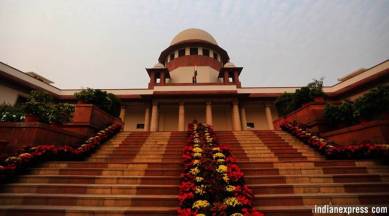Stay updated with the latest - Click here to follow us on Instagram
SC refuses to extend status quo on anti-encroachment drive by Indian Railways near Krishna Janmabhoomi
A bench of Justices Aniruddha Bose and Bela M Trivedi also questioned the locus standi of the petitioner, who, the railways pointed out, was not a resident of the land in question and hence was not affected by the demolition drive.

The Supreme Court Friday declined to extend the status quo order with respect to the anti-encroachment carried out by Indian Railways on its land near Krishna Janmabhoomi in Mathura.
A bench of Justices Aniruddha Bose and Bela M Trivedi also questioned the locus standi of the petitioner, who, the railways pointed out, was not a resident of the land in question and hence was not affected by the demolition drive.
monthly limit of free stories.
with an Express account.
In an affidavit submitted to the court, the railways said that “pursuant to the eviction notices, the demolition of the encroached portion of Railway’s land has already taken place” and that “as such…the…writ petition has become infructuous…”.
The railways said that contrary to the petitioner’s claims that action was carried out overnight without giving notice to the occupants, “fact of the matter is that, for over a decade, an exercise has been undertaken by (it) to identify the exact boundaries of its land around the existing railway-tracks for the purpose of upgradation/expansion of the same”.
Once the boundaries were identified, an exercise was undertaken to identify the encroachers, it pointed out.
The railways said the land in question falls on the side of the Mathura to Vrindavan railway track, which was a pre-independent era meter gauge track.
Mathura to Vrindavan being an important stretch of pilgrimage, it has very high footfall but due to the absence of broad-gauge tracks, pilgrims wanting to visit Vrindavan are compelled to change trains at Mathura Junction.
In June 2022, the project of Vrindavan-Mathura Gauge conversion started and encroachers were served notices but these were not complied with following which the railways took action under the Public Premises Eviction Act, 1951. Accordingly, all trespassers “which comprised of four batches of 42, 47, 41 and five illegal occupants, respectively, were given notices dated 28.02.2023 and 24.04.2023, whereby, they were given 21 days’ time to vacate the railway land on their own”.
However, some of them moved the Allahabad High Court which asked them to approach the Estate Officer, North Central Railway, Mathura. The Estate Officer held several hearings to enable the occupants to establish the ownership of the land and when they failed, consequential action was taken before publication was undertaken in three leading newspapers.
Hearing the matter on August 16, the Supreme Court had ordered status quo in the matter for 10 days. It will hear the case next on August 28.